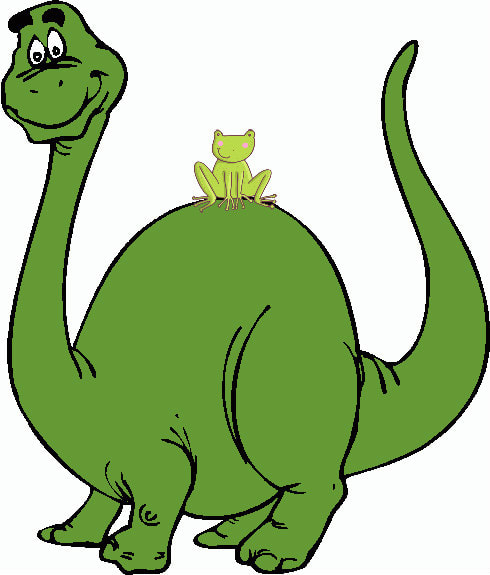1. Dinosaurs were not the first reptiles to rule the earth. The first dinosaurs evolved during the middle to late Triassic period...230 million years ago "in the part of the supercontinent of Pangea that now corresponds with South America." Before then, the dominant land reptiles were archosaurs (ruling lizards), therapsids (mammal-like reptiles), and pelycosaurs (Dimetrodon creatures). And for nearly 20 million years after the first appearance of dinosaurs, the most feared reptiles on the planet were prehistoric crocodiles. "It was only at the beginning of the Jurassic period, 200 million years ago, that dinosaurs truly began their rise to dominance."
2. Dinosaurs prospered for over 150 million years. Humans can live, if they're lucky, to reach maybe 100 years of age. Geologists say that mankind isn't well-adapted to really understanding "deep time." Here's what they mean. "To put things in perspective: modern humans have only existed for a few hundred thousand years, and human civilization only got started about 10,000 years ago, mere blinks of the eye by Jurassic time scales." Humans tend to think that dinosaurs just suddenly went extinct, but if we look at the amazing 165 million years that they survived and prospered, they might be classified as the most successful vertebrate animal "ever to colonize earth!"
3. The dinosaur kingdom was divided into two main branches. You might think that dinosaurs would be divided into the two groups herbivores (plant eaters) and carnivores (meat eaters) but paleontologists see it differently. They believe that the dinos are classified into these groups: the saurischian (lizard-hipped) and the ornithischian or bird-hipped dinosaurs. Oddly enough, birds evolved from "lizard-hipped," rather than "bird-hipped," dinosaurs! Which brings us to the next point.
4. Dinosaurs almost certainly evolved into birds. There a few alternative theories, but the bulk of the evidence points to modern birds evolving from small, feathered theropod dinosaurs "during the late Jurassic and Cretaceous periods. Bear in mind, though, that this evolutionary process may have happened more than once."
5. Some dinosaurs were warm-blooded. Modern turtles and crocodiles are ectothermic, or cold-blooded creatures that rely on the external environment to maintain their internal body temperatures. "There's a solid case to be made that at least some meat-eating dinosaurs--and even a few ornithopods must have been endothermic since it's hard to imagine such an active lifestyle being fueled by a cold-blooded metabolism." But it's reasonable to assume that at least some of the largest dinosaurs were warm-blooded since they would have cooked themselves from the inside out in a matter of hours!
6. Not all dinosaurs were equally dumb. It's true that some plant-eating dinosaurs (like Stegosaurus) had brains so tiny compared to the rest of their bodies that they must have been only a little bit smarter than giant ferns. Okay, that was a little mean but, sadly, kind of true. "Meat-eating dinosaurs large and small, ranging from Troodon to T. Rex, possessed more respectable amounts of grey matter compared to their body size since these reptiles required better-than-average sight, smell, agility, and coordination to reliably hunt down prey." That being said, even the smartest dinosaurs were on an "intellectual par with the modern ostrich...D students, at best."
7. Pterosaurs and marine reptiles weren't technically dinosaurs. The word dinosaur applies only to land-dwelling reptiles possessing a specific hip and leg structure, among other anatomical characteristics. "As large and impressive as some genera (such as Quetzalcoatlus and Liopleurodon) were, flying pterosaurs and swimming plesiosaurs, ichthyosaurs and mosasaurs weren't dinosaurs at all--and some of them weren't even all that closely related to dinosaurs, save for the fact that they're also classified as reptiles." And FYI, Dimetrodon which is often described as a dinosaur was actually a different kind of reptile that flourished tens of millions of years before the dinosaur ever existed!
8. Dinosaurs didn't go extinct all at once. The meteor that impacted the Yucatan Peninsula 65 million years ago didn't instantly incinerate all the dinosaurs on earth. along with many of their cousins. Rathers, extinction was slow and dragged on for hundreds, possibly thousands, of years "as plunging global temperatures, lack of sunlight, and the resulting lack of vegetation profoundly altered the food chain from the bottom up."
There you go, dinosaur fanciers...a few facts that you may have not known about these incredible beasts. Since this will be a short week for me, my beloved friend and teacher The Dharma Frog will be here tomorrow (Tuesday) rather than on his typical Wednesday. I hope you'll stop back by, before getting ready to celebrate Thanksgiving with your loved ones, and hear what Dharma has to say on the subject of gratitude. Bye for now!
Peace.

 RSS Feed
RSS Feed